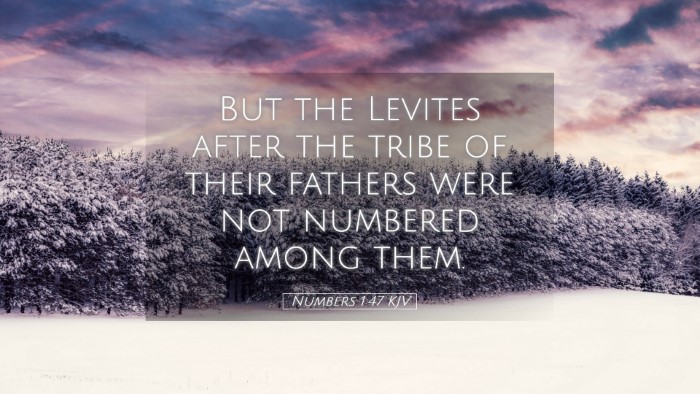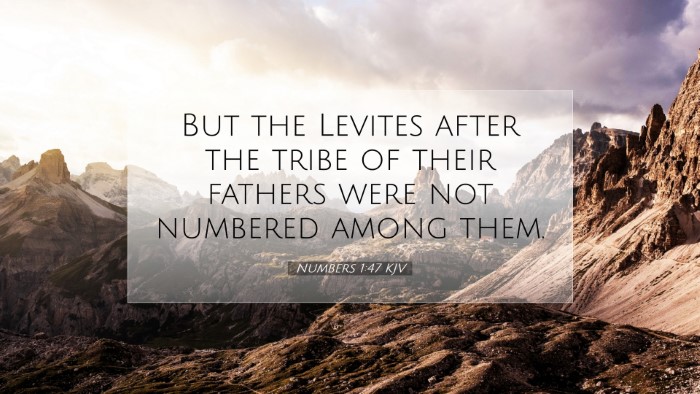Commentary on Numbers 1:47
Numbers 1:47 provides significant insights into the organization of the Israelite camp and their census, acts that serve as precursors to their journey into the Promised Land. This commentary synthesizes views from public domain sources including Matthew Henry, Albert Barnes, and Adam Clarke, focusing on the implications of this verse for understanding the themes of order, divine providence, and covenant responsibilities.
Verse Context
Numbers 1:47 states:
“But the Levites after the tribe of their fathers were not numbered among them.”
This verse follows a detailed enumeration of the tribes of Israel, highlighting the unique role of the Levites within the broader community. Their exemption from the census is foundational for understanding their priestly duties and responsibilities.
Historical Background
In the wilderness, God commanded a census for organizational purposes, emphasizing the importance of order among His people. The Levites’ exclusion from this numbering was ordained to establish their dedicated role in temple service and to underscore their separation from the secular responsibilities of warfare.
Matthew Henry's Insights
According to Matthew Henry, the Levites’ omission from the census signifies their distinct spiritual role. He notes:
- Divine Calling: The Levites were chosen by God for sacred purposes; thus, they were not to be included in the military count, representing a separation into a holy vocation.
- Spiritual Leadership: This exclusion foreshadows the importance of spiritual leaders in guiding Israel, a theme which resonates throughout scripture.
- Symbolism of the Levites: The Levites symbolize the call to holiness and service that is present in every believer’s life.
Albert Barnes' Commentary
Albert Barnes emphasizes the logistical and theological implications of excluding the Levites from the tribal numbers:
- Military Aspect: The Levites were not to engage in warfare; their strength lay in their priests’ responsibilities, which were vital for Israel’s spiritual warfare.
- Order of the Camp: The structure of the camp, with the Levites at its heart, highlights how worship and spiritual order were central to Israel’s identity.
- Foundation of the Priesthood: The priestly duties laid out in Numbers emphasize how God provides for the needs of His people through dedicated service.
Adam Clarke's Perspective
Adam Clarke furthers the analysis by focusing on the social implications of the Levites' role:
- Community Structure: The Levites’ pivotal position suggests a model for community in which spiritual guidance governs social order.
- Covenantal Relationship: The Levites’ exclusion emphasizes their intimate covenant with God, setting a precedent for the later role of Jesus as the ultimate high priest.
- Servanthood: Clarke sees in the Levites an archetype for servanthood, noting that their calling was not for personal gain but for the entire communion of Israel.
Theological Themes
This verse encapsulates several core theological themes:
- God's Sovereignty: The selection of the Levites by God underscores His sovereign choice and authority over His people.
- Role of the Priesthood: It foreshadows the establishment of the Levitical priesthood and the future ministry of Christ as the ultimate High Priest.
- Separation and Holiness: Their separation from the other tribes illustrates the necessity of holiness, particularly in the contexts of worship and service to God.
Practical Implications
For contemporary application, Numbers 1:47 calls leaders and believers alike to examine their roles within the community of faith:
- Holiness in Service: Just as the Levites were set apart for holy tasks, modern believers are called to embrace their unique roles in God’s ministry.
- Structured Community: This verse serves as a reminder of the importance of order within the church to fulfill the purpose God has designated for His people.
- Prioritizing Spiritual Needs: The Levites’ focus on spiritual matters encourages current leaders to prioritize the spiritual welfare of their congregation.
Conclusion
Numbers 1:47 invites readers to reflect on the nature of God’s calling, the structure of His community, and the sacred responsibilities assigned to His people. The insights from historical commentaries bring to life the ongoing relevance of these themes within the contemporary church. As pastors, students, theologians, and scholars reflect on this passage, they are encouraged to explore their own roles in the sacred narrative and strive for a community committed to holiness, order, and divine service.


